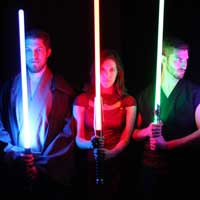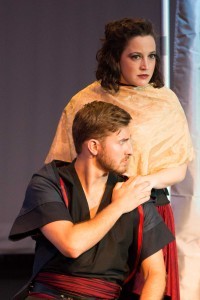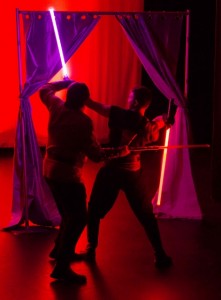
As my friend and I walked to E.D.G.E. Theatre Company’s production of “MacSith,” he asked me that given that it is Shakespeare’s Macbeth, renamed, and set in a Star War’s Universe, whether or not we should use the superstitious nomenclature, “The Scottish Play,” once inside. I told him I wasn’t sure, but after seeing the production, for me, the answer was a resounding yes! This was Shakespeare’s “Macbeth” like I’d never seen it before: hyper-intimate, terrifyingly dark, and surprisingly redemptive (which did require plot changes). Nobody knows how the custom of not saying the name Macbeth in a theatre got started: some believe that it has to do with the play’s supernatural elements while others think that it is because the play, always a commercial success, is so often produced by struggling theatre companies as a last ditch effort shortly before closing, thus giving it a reputation for bad luck.
Whether or not the latter theory is correct, Macbeth is popular, and it is performed, produced, read, and filmed a lot which can make doing new things with it difficult. Of course, one might argue that setting it in a Star Wars Universe complete with Light Saber Combat, and dramatically changing the ending would all but ensure a new take. Yet, it should be noted both that the changes in setting and ending were accomplished largely without alterations (aside from significant cuts to get in down to seventy minutes) to Shakespeare’s dialogue or script, and never to his language or tone, and that the most innovative, affecting, and powerful parts of the show were those that are integral parts of any production of “Macbeth.” 
The witches, who open the show, were more terrifying than I have ever seen them on stage or film, partly through to their extremely dark and gothic make-up and costume (Ashley Woods), partly because of the way in which they were choreographed—swaying around the stage in the most terrifying and sublime movements imaginable (Genevie Lally), partly due to the choice to have a large ensemble of witches appear on stage instead just three, and most of all because of the contortions taking place on their faces with which they literally confront the audience in the opening scene (there were only two rows).
Clearly, director Orion Couling, aware of their talent, uses them as often as possible during the show. They “unsex” Lady Macbeth (Lexi Sanders) in her soliloquy in which she calls upon the forces of darkness to do just that. It’s an impressive moment both because we actually watch the witches obey her spell and because Sanders violent, nearly self-injurious gestures during the incantation, stood in stark and affecting contrast both with the elegance of her costume and person, and the eloquence, force, meaning, and meter with which she delivered Shakespeare’s verse. The chemistry between her and Macbeth (Nick Trouissant) was breathtaking. Their execution of the dialogue concerning his reluctance to Murder Duncan (David Tradeau), suggestive of sexual dysfunction between Macbeth and his Lady as critics have pointed out, was delivered and blocked with great force as were their performances during Duncan’s murder, its aftermath, and at the coronation feast. 
The rest of the cast, even the youngest members, rose to match the performance of the leads, combining tenderness, nobility, and meaning in the delivery of their lines with a fidelity to Shakespeare’s meter, making the language utterly sublime and the words powerful. Each major scene was marked with the same innovative directing, acting, and staging that Couling brought to the opening with the witches and other aforementioned scenes. Too numerous to name each famous moment, they include “the porter’s speech;” Macduff’s (Michael Saubert Jr.) horror when he is told his family has been slaughtered; Lady Macbeth’s insomnia, insanity, and death;” and the ghosts—not just of Banquo (Jack Sharkey), but also Lady Macduff (Sydney Ray), and King Duncan who both accuse and ultimately redeem their murderer’s, allowing the play to be something not as dark as Macbeth, yet much darker.
 Costumes and make up were again very effective here, giving the ghosts the aurora of semi-eschatological figures (a subtle stroke of genius by costumer designer Woods). The stage and combat violence is artistic, always intense and realistic, while remaining tasteful, especially the scenes in which the children are murdered. Obviously, much of the combat involves apparatus taken from the star-wars universe. That said, it is much more important to be familiar with Shakespeare’s play before seeing this production than it is with the Star-Wars franchise (although even a lost beginner can sit back and enjoy the monologues, soliloquies, and language without quite understanding the plot). That is because characters have been renamed, and are rechristened half-way through, and the ending changed. I have used Shakespeare’s names in this review to avoid confusion, and to insist that this really is “Macbeth,” however much that might upset purists among whose ranks I frequently find myself, but they are listed differently in the program and addressed differently during the play. I would advise patrons to arrive early and read the insert in the program before the show which explains the alternations in the plot, ending, and names which are accomplished mainly through visual changes and not alterations to the dialogue.
Costumes and make up were again very effective here, giving the ghosts the aurora of semi-eschatological figures (a subtle stroke of genius by costumer designer Woods). The stage and combat violence is artistic, always intense and realistic, while remaining tasteful, especially the scenes in which the children are murdered. Obviously, much of the combat involves apparatus taken from the star-wars universe. That said, it is much more important to be familiar with Shakespeare’s play before seeing this production than it is with the Star-Wars franchise (although even a lost beginner can sit back and enjoy the monologues, soliloquies, and language without quite understanding the plot). That is because characters have been renamed, and are rechristened half-way through, and the ending changed. I have used Shakespeare’s names in this review to avoid confusion, and to insist that this really is “Macbeth,” however much that might upset purists among whose ranks I frequently find myself, but they are listed differently in the program and addressed differently during the play. I would advise patrons to arrive early and read the insert in the program before the show which explains the alternations in the plot, ending, and names which are accomplished mainly through visual changes and not alterations to the dialogue.
“MacSith” is being produced by E.D.G.E. Theatre Project through June 14th with performances Thursday through Saturday at 8:00 PM and Sunday at 3:00. Performances are held at the Pendulum Theatre Space which is located at 1803 W. Byron Avenue. Tickets are 15 dollars and can be purchased at www.edgeoforion.org. To see what others are saying, visit www.theatreinchicago.com, go to Review Round-up and click at “MacSith”







More Stories
“shucked”
“Hitt Records” Reviewed by Julia W. Rath
“The Berlin Diaries” reviewed by Julia W. Rath